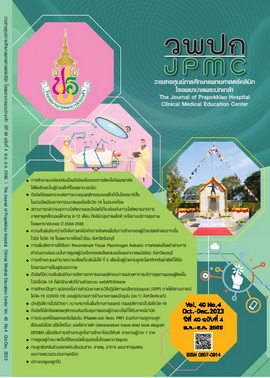Factors Associated with Symptom Management and Health Seeking Behavior Among COVID-19-Infected Patients Undergoing Home Isolation Using the weSAFE@Home System
Main Article Content
Abstract
BACKGROUND: Extensive research has been conducted on various aspects of COVID-19; however, it is crucial to acknowledge that specific content about symptom management in Thailand may be different when compared to other countries.
OBJECTIVES: This study aimed to examine the relationship between symptom severity, perception of symptom consequences, health-seeking behaviors, symptom management methods, and the outcomes from symptom management among COVID-19-infected patients undergoing home isolation and utilizing the weSAFE@Home system.
METHODS: A descriptive correlational study was conducted using a simple random sampling method with a lottery approach without replacement to include 193 study participants, following the inclusion criteria, which were COVID-19-infected patients who chose home isolation and utilized the weSAFE@Home platform from December 20, 2022, to March 31, 2030. The questionnaire included personal characteristics, COVID-19 symptoms, and symptom management practices. A questionnaire based on symptom management symptom severity, perception of symptom consequences, health-seeking behaviors, and symptom management methods of COVID-19-infected patients was developed, with reliability coefficients of 0.85, 0.97, and 0.91, respectively. Data was analyzed using descriptive statistics, correlations, and the Spearman Rank Correlation Coefficient.
RESULTS: The findings of this study indicated symptom severity (rs=0.45, p<0.001), perception of consequences (rs=0.36, p<0.001), the adoption of symptom management techniques (rs=0.70, p<0.001) were statistically significant positive correlation with the outcomes of symptom management. However, a correlation between health-seeking behavior and symptom management outcome was not statistically significant.
CONCLUSIONS: The results of this study provide valuable insights that can be utilized in future research endeavors to develop a comprehensive model for managing symptoms in COVID-19-infected patients during home isolation. These findings hold significant importance for nursing practices as they contribute to pragmatic care approach development and guidance for this specific patient group, who necessitate continuous self-care at home.
Article Details

This work is licensed under a Creative Commons Attribution-NonCommercial-NoDerivatives 4.0 International License.
References
World Health Organization. WHO Coronavirus (COVID-19) dashboard [Internet]. 2023 [cited 2023 April 25]. Available from: https://covid19.who.int/
Department of Disease Control. COVID-19 patient situation [Internet]. 2023. [cited 2023 April 25]. Available from: https://ddc.moph.go.th/covid19-dashboard/
Khosravani H, Steinberg L, Incardona N, Quail P, Perri GA. Symptom management and end-of-life care of residents with COVID-19 in long-term care homes. Can Fam Physician 2020;66:404-6.
Renshaw J, Caulkin R, Cox S, Dave D, McAleny L. Symptom management of COVID-19 positive patients in an acute NHS trust: a specialist palliative care team perspective. Clin Med (Lond) 2021;21(Suppl 2):15-6.
Dodd M, Janson S, Facione N, Faucett J, Froelicher ES, Humphreys J, et al. Advancing the science of symptom management. J Adv Nurs 2001;33:668-76.
Nawsuwan K, Singweratham N, Damsangsawas N. Correlation of perception disease severity to implementation role for control of COVID-19 in communities among village health volunteers in Thailand. J Bamrasnaradura Infect Dis Inst 2020;14:92-103.
Poortaghi S, Raiesifar A, Bozorgzad P, Golzari SE, Parvizy S, Rafii F. Evolutionary concept analysis of health seeking behavior in nursing: a systematic review. BMC Health Serv Res [Internet]. 2015 [cited 2023 Apr 25]; 15:523. Available from: https://bmchealthservres.biomedcentral.com/articles/10.1186/s12913-015-1181-9
Kleinman A. Patients and healers in the context of culture: an exploration of the borderland between anthropology, medicine, and psychiatry. Berkeley: University of California Press; 1980.
Danso-Appiah A, Stolk WA, Bosompem KM, Otchere J, Looman CW, Habbema JD, et al. Health seeking behaviour and utilization of health facilities for schistosomiasis-related symptoms in Ghana. PLoS Negl Trop Dis [Internet]. 2010 [cited 2023 Apr 25]; 4(11):e867. Available from: https://journals.plos.org/plosntds/article?id=10.1371/journal.pntd.0000867
Siam MHB, Hasan MM, Tashrif SM, Rahaman Khan MH, Raheem E, Hossain MS. Insights into the first seven-months of COVID-19 pandemic in Bangladesh: lessons learned from a high-risk country. Heliyon [Internet]. 2021 [cited 2023 Apr 25]; 7(6):e07385. Available from: https://www.cell.com/action/showPdf?pii=S2405-8440%2821%2901488-2
Petersen MS, Í Kongsstovu S, Eliasen EH, Larsen S, Hansen JL, Vest N, et al. Clinical characteristics of the omicron variant results from a nationwide symptoms survey in the Faroe islands. Int J Infect Dis 2022;122:636-43.
Muangsakul W, Ditajorn R, Pengsri B, Virojana N. The medical pluralism for holistic prevention of COVID-19. Journal of Nursing Siam University 2022;23(45):99-111.
Choosrithong R. Important herbs in the era of Covid for the general public. Journal of Social Science for Local Rajabhat Mahasarakham University 2022;6(1):293-300.
Katanyutanon T, Thongsiri T, Pichitchainarong A, Kingdokmai T, Thammakul S, Saenkamrang P, et al. Factors related to COVID-19 preventive behaviors among health science students of Huachiew Chalermprakiet university. Huachiew Chalermprakiet Science and Technology Journal 2021;7(1):8-20.
Malasri J, Jaidee PH. Factors influencing community leaders’ participation for prevention and control of the Coronavirus disease 2019 in Phanat nikhom district, Chonburi province. J Prapokklao Hosp Clin Med Educat Center 2022;39:229-37.
Muanphak N, Panyasaisophon T, Aeksanti T. The health belief model, health impact and COVID-19 preventive behaviors among the population on Nakhon Ratchasima province. Journal of Nursing and Health Care 2022;40(2):85-94.

